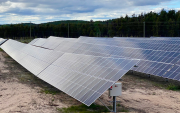Two things become clear when talking with the extraordinary women in Canada who are guiding the transition to clean energy – their sense of urgency and their unwillingness to leave anyone behind.
The urgency is founded on their deep understanding of the looming global climate catastrophe, with the world at a tipping point that experts say we may not recover from.
“We can see what's happening around the world in terms of climate disaster so the necessity to transition is not negotiable at this point,” says Bipasha Baruah, a professor and Canada Research Chair in Global Women’s Issues at Western University in London, Ont.
An urgent need to transition, but one that must be considered thoughtfully
But even as the world weans itself off fossil fuels and moves to more sustainable sources of power and heat, many of the women interviewed as part of the Women in Energy Transformation Series – a collaboration between the Pembina Institute and GLOBE Series – talk about the need for a “just and equitable” transition.
Some of their concern has been informed by their own life experiences. A significant number of them spoke about the difficulties they’ve faced in a sphere traditionally dominated by men. But it’s mostly founded on a genuine concern for disadvantaged groups, both here in Canada and abroad, and the belief that in 2021, access to energy is a human right along with access to food, water and shelter.
Kehkashan Basu, founder of the Green Hope Foundation, says the transition to renewables creates opportunities to provide electricity to countries and communities that are not well served by existing utilities and grids. “It's just kind of logical to use clean energy as a tool to help empower them instead of going the usual route of fossil-fuel powered electricity,” she says. “In this way, we’re leaving no one behind and we are creating a positive impact on the planet.
Lili-Anna Pereša, president and CEO of the McConnell Foundation, says energy makes it possible for children to study at night. “I can tell you that studying under an oil lamp is not the same thing” as studying under electric light, she says. And “nowadays you need to have a computer everywhere in the world. In agriculture in Africa, farmers use their iPhones to know what the weather is going to be like. So they have to have energy.”
Climate leaders say Canada must lead on equity and inclusion
The move to clean energy, the women say, can also address inequities here in Canada where the production and distribution of electricity is in the hands of a small number of players.
“There are a number of groups that have been traditionally left behind, not only in the energy sector, but across sectors,” says Aisha Bukhari, vice president and executive board member of Women in Renewable Energy (WiRE). “As we’re transitioning to net-zero, I think this is not only one of the biggest opportunities for economic prosperity, but also a great opportunity for us to have an inclusive transition.”
Binnu Jeyakumar, clean energy director at the Pembina Institute, says as we usher in a new energy economy, we have the chance to make sure we don't perpetuate a structure that has benefitted the few.
“That’s really exciting for me – to make it more inclusive of groups that have been excluded such as Indigenous peoples, women, and people of colour,” Jeyakumar says. “Within our societies, within developed countries, there are all these inequities … it should not be a transition that unfairly advantages one side over another or one group of people over another.”
The energy transition is an opportunity for everyone to benefit
Many say the move to include more people in the energy sector will reap widespread rewards.
Anna Murray, managing director and global head of ESG at SLC Management, says Canada’s incredibly rich social fabric lends itself to a successful transition if done with equity, diversity, and inclusion in mind. “Having varied stakeholder perspectives to guide our collective transition will enable us to go faster and farther as a country in the transition to a low carbon economy,” she says.
But it will require widespread will for change.
Arlene Strom, chief legal officer and general counsel at Suncor, says this shift to a more inclusive energy future will take more than government policies that are designed to change behaviour.
“It requires change in how we produce energy, it requires change in how we consume energy. It requires change in how we share the benefits,” Strom says. “We must enable actions so that all can contribute to the energy transition – not just those with lots of resources.”
It is time, says Western University’s Dr. Baruah, for the benefits of energy to be shared evenly by different groups of people in society. “And, by that, I don't just mean women,” she says. “I also want to see Indigenous peoples benefit equitably, I want to see new immigrants and people with disabilities benefit. I want to see the transition happen in a way that is much more diverse than it's been in the past.”
Women in Energy Transformation kicks off on September 29th with a free public event featuring live interviews of women climate leaders, including Kehkashan Basu featured in this article. Register now and check out the rest of our upcoming events.






